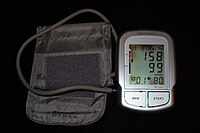
Photo from wikipedia
Objective: to evaluate different effects on blood pressure (BP) control depending on the time of administration of antihypertensive treatment in resistant (rHTN) and controlled (HTN) hypertension patients. Design and method:… Click to show full abstract
Objective: to evaluate different effects on blood pressure (BP) control depending on the time of administration of antihypertensive treatment in resistant (rHTN) and controlled (HTN) hypertension patients. Design and method: We studied 51 patients with true rHTN confirmed by the office and ambulatory BP monitoring (ABPM) despite the use of 3 antihypertensive medications with diuretic and 58 participants with HTN by triple therapy. Two groups of patients were comparable for age, sex and body mass index. All patients at baseline were randomized to ingest fixed-dose triple-combination (FDTC) upon awakening or at bedtime. Office BP and 24-h ABPM were evaluated at baseline and after 3 months. The analysis of the influence of chronotherapy on the reduction of BP was studied separately in the groups of patients with rHTN and HTN. Results: There were no significant differences in adherence to therapy, office BP and average daytime and nighttime BP between the patients of the bedtime compared with the morning-treatment group in HTN and rHTN. In HTN patients normalization of clinic BP and ABPM values were observed at month 3 of follow-up, relative to baseline regardless of the time administration of FDTC. There was attenuated prevalence of non-dipping at the final evaluation (43 % vs 14 %, P < 0.01) in bedtime treatment, but some non-dipper patients (75 %) had over-dipping pattern. In rHTN patients reduction in average 24-h BP was greater with night-time administration than morning (−23.8/−16.7 mmHg vs. −16.1/−9.4 mm Hg, P < 0.05) both due lowering effect to daytime and nighttime BP. However, the decrease in office BP did not differ between the groups. Bedtime treatment was associated with restoring the dipping BP profile in nondipping rHTN patients (80 % vs 33 % in patients on morning treatment, P < 0.01). Conclusions: In rHTN patients ingestion of FDTC at bedtime compared with ingestion of medication upon awakening results in improved ambulatory BP control during day and night and restored normal dipper-type circadian BP rhythm. In HTN patients, bedtime dosing of FDTC demonstrated extreme dipping BP patterns even in patients with a blunted fall in night-time BP.
Journal Title: Journal of Hypertension
Year Published: 2018
Link to full text (if available)
Share on Social Media: Sign Up to like & get
recommendations!